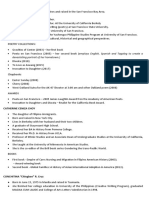Workshop 3 Done in Class
Uploaded by
api-269162555Workshop 3 Done in Class
Uploaded by
api-2691625551
Title: EDUC 222 THE TEACHING OF ENGLISH AS A SECOND LANGUAGE IN THE
ELEMENTARY LEVEL
Workshop # 3
Diana Snchez Martnez
Amy C. Marty Santos
University of Turabo
School of Professional Studies
Ahora Program
Title: EDUC 222 THE TEACHING OF ENGLISH AS A SECOND LANGUAGE IN THE
ELEMENTARY LEVEL
I.
Part
AGREEMENT EXERCISE A
For each pair of sentences below, write out the correct form of the verb in
parentheses. Keep to the present tense, and be guided by our four tips for
agreement and our three special cases.
1. Do you know how to play bocce? The game does not require any special athletic
abilities.
2. There is a new bocce league at the recreational center. There are several teams
in the league.
3. I have a new set of bocce balls. My friend has a new pallino ball.
4. Bocce is a game for people of all ages. I am going to show you how to play.
5. The players take turns rolling a ball down the court. Each of the players takes
one ball and aims for the pallino.
6. We try to get our balls as close to the pallino as possible. Rick often tries to
bounce his ball off the side of the court.
7. Nobody enjoys playing bocce more than I do. Everybody who plays bocce
enjoys the game.
8. There are four players on each team. There is a tournament at the end of the
season.
9. The winners of the tournament carry home a trophy. Everyone carries home
good memories.
10. I am ready to play a game now. You and your friends are welcome to join us.
Title: EDUC 222 THE TEACHING OF ENGLISH AS A SECOND LANGUAGE IN THE
ELEMENTARY LEVEL
AGREEMENT EXERCISE B
For each pair of sentences below, write out the correct form of the verb in
parentheses. Keep to the present tense, and be guided by our four tips for
agreement and our three special cases.
1. Both candidates oppose increased defense spending. Neither of the two
candidates oppose the war in Iraq.
2. Not one of these cell phones belongs to me. One of the phones belongs to
Merdine.
3. Most students take all of their classes in the morning. Nobody takes classes
after 2:00.
4. One of my hobbies is collecting shopping bags. My hobbies are unusual.
5. Gus and Merdine want a trial separation. Neither one wants to move out of the
apartment.
6. Neither of the players admits that he made an error. Both players admit that
somebody made a mistake.
7. Both the manager and her assistant have been fired. Neither the manager nor
her assistant has been notified.
8. Where is your little brother? Several pages from my journal are missing.
9. Professor Legree often goes for long walks in the rain. The lights in his house go
on at midnight.
10. The students in the back of the room play poker during breaks. The student
who sits next to the refreshments plays solitaire.
Title: EDUC 222 THE TEACHING OF ENGLISH AS A SECOND LANGUAGE IN THE
ELEMENTARY LEVEL
AGREEMENT EXERCISE C
The following paragraph contains six errors in subject-verb agreement. Find and
correct each of the six verb errors. Remember to stay in the present tense, and be
guided by our four tips for agreement and our three special cases.
Santa
According to legend, Santa Claus is a fat old man who visits every house on our
planet in about eight hours on one of the coldest nights of the year. Santa, as
everybody knows, stops for a glass of milk and a cookie at each house along the
route. He prefers to work unnoticed, so he wears a luminous red suit and travels
with a pack of bell-jangling reindeer. For reasons that most people do not
understand, this jolly old man enters each house not by the front door but through
the chimney (whether you have a chimney or not). He customarily gives generously
to children in wealthy families, and he usually reminds poorer children that it's the
thought that counts. Santa Claus is one of the earliest beliefs that parents try to
instill in their children. After this absurdity, it's a wonder that any child ever believes
in anything again.
Title: EDUC 222 THE TEACHING OF ENGLISH AS A SECOND LANGUAGE IN THE
ELEMENTARY LEVEL
II.
Proofreading exercise:
a. A Fluke of Luck
The following paragraph contains five errors in subject-verb agreement.
Identify and correct the faulty verb forms.
The sheep-liver fluke is a parasitic flatworm with a very complex life
cycle. The fluke starts life by hatching inside a snail. The fluke is
then ejected from the snail in a ball of slime. These balls of slime
are eaten by ants. The fluke digs its way through the ant's body
until it reaches the ant's brain. There, the fluke takes control of the
ant by manipulating its nerves, thus turning the ant into its personal
robot. Under the command of the fluke, the ant climbs to the top of
a blade of grass. If the fluke is in luck, the ant is eaten by a passing
sheep. From the sheep's stomach, the fluke works its way home--to
the liver.
b. Proofreading exercise: Life Forms
The following paragraph contains seven errors in subject-verb
agreement. Identify and correct the faulty verb forms.
Anomie Plaza, like all shopping plazas, is designed for automobiles
rather than human beings. All natural life has been extinguished;
even the weeds along the curb appear artificial. But somehow,
amidst all the plastic, steel, and concrete, a solitary shrub manages
to survive. The shrub, not in vigorous bloom but certainly alive,
Title: EDUC 222 THE TEACHING OF ENGLISH AS A SECOND LANGUAGE IN THE
ELEMENTARY LEVEL
stands a few yards away from the entrance to Huxley's department
store. It grows straight up through the concrete. Now and then a
shopper pauses to examine this odd life form, not for sale in any of
the 67 stores. Occasionally, someone will glance around furtively
and then break off a twig, slip it into a shopping bag, and hurry
back to the parking lot. Why people do this is a mystery to me. Are
such people intent on preserving life or destroying it? Whatever the
case may be, the shrub so far has managed to survive all assaults.
Title: EDUC 222 THE TEACHING OF ENGLISH AS A SECOND LANGUAGE IN THE
ELEMENTARY LEVEL
III.
Comparative and Superlative
The comparative is used to compare things or people that are (1) two things or two
people. The superlative is used to compare one member of a group with the (2) whole
group.
Adjectives of one syllable.
These adjectives form comparatives with er and superlatives with est.
Adjectives ending with -e add -r for the comparative, and -st for the superlative
form.
Adjectives ending with one vowel followed by one consonant, double the final
consonant and add -er for comparative and -est for superlative forms.
Adjective
Comparative
Superlative
small
* late
** hot
smaller
later
hotter
(the) smallest
(the) latest
(the) hottest
(3)thin
(4)thinner
(the) (5) thinnest
Adjectives ending in -y
When adjectives end in -y, we change the -y to an (6)i and add -er for (7)comparative
and -est for(8)superlative.
Adjective
happy
dirty
(9) funny
Comparative
happier
dirtier
(10) funnier
Superlative
(the) happiest
(the) dirtiest
(the) (11) funniest
Adjectives of two or more syllables
With most other two-syllable adjectives, we use more for comparative and most for
superlative forms.
Title: EDUC 222 THE TEACHING OF ENGLISH AS A SECOND LANGUAGE IN THE
ELEMENTARY LEVEL
Adjective
Comparative
Superlative
boring
interesting
more boring
more interesting
(the) most boring
(the) most interesting
(12)excited
(13)more excited
(14) most excited
Irregular Adjectives
Some adjectives are (15)irregular and must be learned separately!
Adjective
Comparative
Superlative
good
bad
(16)old
better
worse
(17)elder
(the) best
(the) worst
(18)(the)eldest
Two (19)syllable adjectives that can use both kinds of comparatives and
superlatives
Common, handsome, polite, quiet, wicked, pleasant, cruel, stupid and words ending in ow, -er, and and -le can all use (20)both kinds of comparative and superlative
adjectives.
For almost all of these words, the forms with more and most are more (21)common.
Adjective
Comparative
Superlative
quiet
shallow
quieter / more quiet
shallower/more shallow
(the) quietest / most quiet
(the) shallowest/most shallow
(22)wicked
(23)more wicked/wickeder
(24) wickedest/most wicked
Word List
two things or two people.
-er
(the) eldest
common
(the) funniest
-est
Title: EDUC 222 THE TEACHING OF ENGLISH AS A SECOND LANGUAGE IN THE
ELEMENTARY LEVEL
(the) most excited
old
(the) wickedest/most wicked
wicked
Silly
both
Comparative
elder
Most
irregular
Thinner
more
more excited
funny
more wicked/wickeder
whole group
superlative
funnier
thin
(the) thinnest
excited
IV.
Active and Passive
a. Exercise 1
You have 7 out of 7 answers correct.
1. In active voice, Your answer b) the subject does the action expressed in
the verb is correct.
o
a) the subject receives the action expressed in the verb.
b) the subject does the action expressed in the verb.
c) the verb must show motion (e.g., run, walk, throw).
Active voice means that the subject is doing the action expressed in the verb.
In passive voice, the subject is the receiver of the action. (For example, in the
passive sentence The letter was thrown out, the subject letter is receiving the
action of throwing, not doing it.) A verb in active voice does not necessarily
show motionthe sentence I hope to see you at the party is in active voice,
even though there is no motion involved.
2. Which sentence is in active voice? Your answer b) The cat slept peacefully on
the couch is correct.
o
a) We were jolted by the news.
b) The cat slept peacefully on the couch.
c) The boat was tossed about by the waves.
10
Title: EDUC 222 THE TEACHING OF ENGLISH AS A SECOND LANGUAGE IN THE
ELEMENTARY LEVEL
Only sentence (b) has a subject (cat) doing the action expressed in the verb
(slept). (Yes, sleep is an action!) Sentences (a) and (c) are passive, since the
subjects (we, boat) are receiving rather than doing the actions expressed in the
verbs (jolted, tossed).
3. In passive voice,
Your answer a) the subject receives the action expressed in the verb is
correct.
o
a) the subject receives the action expressed in the verb.
b) the subject does the action expressed in the verb.
c) the verb does not express any action.
Passive voice means that the subject is receiving rather than doing the action
expressed in the verb. A verb in the passive voice is always an action verb,
since only an action verb can have a receiver.
4. Which sentence is in passive voice?
Your answer c) Eric has been offered a leading role in the play is correct.
o
a) Ilse was tired after her long hike.
b) Do you think it is time for the pets to be fed?
c) Eric has been offered a leading role in the play.
Only sentence (c) is in passive voice, because the subject (Eric) is receiving
rather than doing the action in the verb, and the verb is passive, formed from
the helper be (has been) and a past participle (offered). Sentence (a) contains
a form of the verb be (was); but in this case, was is a linking verb with a
subject complement (tired), not a passive voice verb. In sentence (b), the
infinitive phrase to be fed is passive, but the verb itself (do think) is in active
voice.
5. Which statement is most correct?
Your answer b) Passive voice may sometimes be better than active is
correct.
o
a) Active voice is always better than passive.
b) Passive voice may sometimes be better than active.
11
Title: EDUC 222 THE TEACHING OF ENGLISH AS A SECOND LANGUAGE IN THE
ELEMENTARY LEVEL
o
c) Passive voice should be used only in legal writing.
Passive voice may be more effective when the doer of the action is unknown, is
unimportant or is better left unnamed, out of tact (e.g., I was given the wrong
directions instead of Your secretary gave me the wrong directions).
6. Which answer is best?
Your answer c) Both (a) and (b) are true is correct.
o
a) Active voice puts ideas into logical order.
b) Active voice uses fewer words than passive voice.
c) Both (a) and (b) are true.
Active voice states the doer of the action, then the action, and lastly the
receiver of the action, so the order of ideas is logical. Also, passive voice uses
more words because it adds the helping verb be to the main verb and puts the
preposition by in front of the doer of the action.
7. Passive voice is useful
Your answer c) when you want your message to be tactful is correct.
o
a) when you want your message to be direct.
b) when you want your message to be objective.
c) when you want your message to be tactful.
The best answer is (c) when you want your message to be tactful (e.g., I was
given the wrong directions). Active voice is more direct than passive. And
although some writing uses passive voice to create an appearance of objectivity,
the use of passive voice doesn't actually make a message more objective.
b. Exercise 2
Directions: Indicate if a sentence or question is in the passive voice or the active
voice. Circle "Passive" or "Active."
1. A bridge was built so that cars could cross the river. Passive or Active
12
Title: EDUC 222 THE TEACHING OF ENGLISH AS A SECOND LANGUAGE IN THE
ELEMENTARY LEVEL
2. The students have been learning how to write better
paragraphs. Passive or Active
3. Most of these computers are used for surfing the internet. Passive or Active
4. A movie is being made in our town. Passive or Active
5. Jan hasn't decided which book to read. Passive or Active
6. The newspaper is going to be delivered in the morning. Passive or Active
7. Has the timer gone off yet? Passive or Active
8. How many different countries have you visited in your lifetime?
Passive or Active
9. These reports can't be completed until we get more information.
Passive or Active
10. Her fingers got burned when she reached into the oven. Passive or Active
11. The company should have managed the situation differently.
Passive or Active
12. The garbage is picked up early in the morning. Passive or Active
13. A doctor has been treating her for her depression. Passive or Active
14. What kind work have you been doing for them? Passive or Active
15. An award has been given to the police officer who helped the stranded
motorist. Passive or Active
13
Title: EDUC 222 THE TEACHING OF ENGLISH AS A SECOND LANGUAGE IN THE
ELEMENTARY LEVEL
16. He was fired because he wasn't getting his work done on time.
Passive or Active
17. The information will be posted online. Passive or Active
18. When do you get paid? Passive or Active
19. Alice says she will be retiring from her job next year. Passive or Active
20. Several changes have been made to the schedule. Passive or Active
You might also like
- Lesson 2 Evaluating Written Texts by Analyzing ClaimsNo ratings yetLesson 2 Evaluating Written Texts by Analyzing Claims6 pages
- English As The Medium of Instruction For Science and Its Effects On The Languages of The PhilippinesNo ratings yetEnglish As The Medium of Instruction For Science and Its Effects On The Languages of The Philippines22 pages
- The Impact of Lack of Social and Academic Skills of Grade 7 Students in Surigao Del Norte National High School Group 5No ratings yetThe Impact of Lack of Social and Academic Skills of Grade 7 Students in Surigao Del Norte National High School Group 59 pages
- Difficulties of Students in Grammar and Speech (Practical ResearchNo ratings yetDifficulties of Students in Grammar and Speech (Practical Research15 pages
- Practical Research 2 Module 2 Lesson 1 and 2 - RosalesNo ratings yetPractical Research 2 Module 2 Lesson 1 and 2 - Rosales5 pages
- ME EngRW 11 Q3 0201 - SG - Organizing Information Through A Brainstorming ListNo ratings yetME EngRW 11 Q3 0201 - SG - Organizing Information Through A Brainstorming List12 pages
- Comptency 3 Using Patterns of Development in Writing Across DisciplinesNo ratings yetComptency 3 Using Patterns of Development in Writing Across Disciplines7 pages
- 21St Century Literature From The Philippines and The World0% (1)21St Century Literature From The Philippines and The World128 pages
- Republic of The Philippines Department of Education Bislig City Division Bislig City National High School Bislig CityNo ratings yetRepublic of The Philippines Department of Education Bislig City Division Bislig City National High School Bislig City22 pages
- Sacred Heart Villa School "Maria Schinina": 181 Aguinaldo Highway, Lalaan I, Silang, Cavite (046) 423 - 340350% (4)Sacred Heart Villa School "Maria Schinina": 181 Aguinaldo Highway, Lalaan I, Silang, Cavite (046) 423 - 34035 pages
- Prepared by Miss Mary Katrine M. BelinoNo ratings yetPrepared by Miss Mary Katrine M. Belino51 pages
- Impact of Media Text in Improving Academic Performance of Grade 10 in English at Peñaranda National High SchoolNo ratings yetImpact of Media Text in Improving Academic Performance of Grade 10 in English at Peñaranda National High School4 pages
- What Is An Educated Filipino Francisco BenitezNo ratings yetWhat Is An Educated Filipino Francisco Benitez1 page
- Name: - Control No.: - Address: - Parent's Signature: - Contact No.100% (1)Name: - Control No.: - Address: - Parent's Signature: - Contact No.50 pages
- Timeline of My Exposure To Traditional Media and New Media Momo FinalNo ratings yetTimeline of My Exposure To Traditional Media and New Media Momo Final25 pages
- A Study On The Understanding of Grammar Among English Major Students at The University of Tripoli, Faculty of LanguagesNo ratings yetA Study On The Understanding of Grammar Among English Major Students at The University of Tripoli, Faculty of Languages17 pages
- Lesson 4 The Period of Enlightenment (1872-1898) : Historical BackgroundNo ratings yetLesson 4 The Period of Enlightenment (1872-1898) : Historical Background9 pages
- Vocabulary Difficulty and Learning Strategies of Grade 8-Special Science Class Students in Reading Afro-Asian Literary TextsNo ratings yetVocabulary Difficulty and Learning Strategies of Grade 8-Special Science Class Students in Reading Afro-Asian Literary Texts7 pages
- Region Vi Western Visayas: Clem Vincent Dela Cruz Barandia100% (1)Region Vi Western Visayas: Clem Vincent Dela Cruz Barandia15 pages
- Greatest Contribution of American To Philippine LiteratureNo ratings yetGreatest Contribution of American To Philippine Literature10 pages
- Francisco Arcellana: 4 Life Lessons That Can Be Derived From The StoryNo ratings yetFrancisco Arcellana: 4 Life Lessons That Can Be Derived From The Story1 page
- Preliminary Activity For The Literature of The Regions in The Philippines100% (2)Preliminary Activity For The Literature of The Regions in The Philippines2 pages
- The Literatures of The Philippines: Lesson 3No ratings yetThe Literatures of The Philippines: Lesson 344 pages
- Factors Affecting English Language Pronounciation To StudentsNo ratings yetFactors Affecting English Language Pronounciation To Students33 pages
- Footnote To Youth Summary by Jose Garcia VillaNo ratings yetFootnote To Youth Summary by Jose Garcia Villa1 page
- Title: Educ 222 The Teaching of English As A Second Language in The Elementary LevelNo ratings yetTitle: Educ 222 The Teaching of English As A Second Language in The Elementary Level16 pages
- A Tentative Syntax of Modern Indo-EuropeanNo ratings yetA Tentative Syntax of Modern Indo-European240 pages
- Download Complete Collins COBUILD Intermediate English Grammar 2nd Edition Dave Willis PDF for All ChaptersNo ratings yetDownload Complete Collins COBUILD Intermediate English Grammar 2nd Edition Dave Willis PDF for All Chapters77 pages
- Upsr PMR English Sentence Construction ActivitiesNo ratings yetUpsr PMR English Sentence Construction Activities2 pages
- Elementary Language Practice 3rd Edition by Michael Vince 2010 PDF RarNo ratings yetElementary Language Practice 3rd Edition by Michael Vince 2010 PDF Rar291 pages
- The Men Carefully Walked Across The Bridge. The Mouse - Ate The CheeseNo ratings yetThe Men Carefully Walked Across The Bridge. The Mouse - Ate The Cheese29 pages
- Lesson 2 - Characteristics of Korean LanguageNo ratings yetLesson 2 - Characteristics of Korean Language4 pages
- 3A Position of Adverbs of Frequency: Adverbs Words That Describe Verbs, Sentences And/Or Adjectives ExamplesNo ratings yet3A Position of Adverbs of Frequency: Adverbs Words That Describe Verbs, Sentences And/Or Adjectives Examples6 pages
- Full download Slovene A Comprehensive Grammar 2nd Edition Peter Herrity pdf docx100% (4)Full download Slovene A Comprehensive Grammar 2nd Edition Peter Herrity pdf docx60 pages
- Easily Confused Words Worksheet (Usage)No ratings yetEasily Confused Words Worksheet (Usage)14 pages
- Passive Constructions in English and Serbian...No ratings yetPassive Constructions in English and Serbian...8 pages
- Lesson 2 Evaluating Written Texts by Analyzing ClaimsLesson 2 Evaluating Written Texts by Analyzing Claims
- English As The Medium of Instruction For Science and Its Effects On The Languages of The PhilippinesEnglish As The Medium of Instruction For Science and Its Effects On The Languages of The Philippines
- The Impact of Lack of Social and Academic Skills of Grade 7 Students in Surigao Del Norte National High School Group 5The Impact of Lack of Social and Academic Skills of Grade 7 Students in Surigao Del Norte National High School Group 5
- Difficulties of Students in Grammar and Speech (Practical ResearchDifficulties of Students in Grammar and Speech (Practical Research
- Practical Research 2 Module 2 Lesson 1 and 2 - RosalesPractical Research 2 Module 2 Lesson 1 and 2 - Rosales
- ME EngRW 11 Q3 0201 - SG - Organizing Information Through A Brainstorming ListME EngRW 11 Q3 0201 - SG - Organizing Information Through A Brainstorming List
- Comptency 3 Using Patterns of Development in Writing Across DisciplinesComptency 3 Using Patterns of Development in Writing Across Disciplines
- 21St Century Literature From The Philippines and The World21St Century Literature From The Philippines and The World
- Republic of The Philippines Department of Education Bislig City Division Bislig City National High School Bislig CityRepublic of The Philippines Department of Education Bislig City Division Bislig City National High School Bislig City
- Sacred Heart Villa School "Maria Schinina": 181 Aguinaldo Highway, Lalaan I, Silang, Cavite (046) 423 - 3403Sacred Heart Villa School "Maria Schinina": 181 Aguinaldo Highway, Lalaan I, Silang, Cavite (046) 423 - 3403
- Impact of Media Text in Improving Academic Performance of Grade 10 in English at Peñaranda National High SchoolImpact of Media Text in Improving Academic Performance of Grade 10 in English at Peñaranda National High School
- Name: - Control No.: - Address: - Parent's Signature: - Contact No.Name: - Control No.: - Address: - Parent's Signature: - Contact No.
- Timeline of My Exposure To Traditional Media and New Media Momo FinalTimeline of My Exposure To Traditional Media and New Media Momo Final
- A Study On The Understanding of Grammar Among English Major Students at The University of Tripoli, Faculty of LanguagesA Study On The Understanding of Grammar Among English Major Students at The University of Tripoli, Faculty of Languages
- Lesson 4 The Period of Enlightenment (1872-1898) : Historical BackgroundLesson 4 The Period of Enlightenment (1872-1898) : Historical Background
- Vocabulary Difficulty and Learning Strategies of Grade 8-Special Science Class Students in Reading Afro-Asian Literary TextsVocabulary Difficulty and Learning Strategies of Grade 8-Special Science Class Students in Reading Afro-Asian Literary Texts
- Region Vi Western Visayas: Clem Vincent Dela Cruz BarandiaRegion Vi Western Visayas: Clem Vincent Dela Cruz Barandia
- Greatest Contribution of American To Philippine LiteratureGreatest Contribution of American To Philippine Literature
- Francisco Arcellana: 4 Life Lessons That Can Be Derived From The StoryFrancisco Arcellana: 4 Life Lessons That Can Be Derived From The Story
- Preliminary Activity For The Literature of The Regions in The PhilippinesPreliminary Activity For The Literature of The Regions in The Philippines
- Factors Affecting English Language Pronounciation To StudentsFactors Affecting English Language Pronounciation To Students
- A Study Guide for Hamsad Rangkuti's "The Fence"From EverandA Study Guide for Hamsad Rangkuti's "The Fence"
- Title: Educ 222 The Teaching of English As A Second Language in The Elementary LevelTitle: Educ 222 The Teaching of English As A Second Language in The Elementary Level
- Milliken's Complete Book of Homework Reproducibles - Grade 6From EverandMilliken's Complete Book of Homework Reproducibles - Grade 6
- Download Complete Collins COBUILD Intermediate English Grammar 2nd Edition Dave Willis PDF for All ChaptersDownload Complete Collins COBUILD Intermediate English Grammar 2nd Edition Dave Willis PDF for All Chapters
- Elementary Language Practice 3rd Edition by Michael Vince 2010 PDF RarElementary Language Practice 3rd Edition by Michael Vince 2010 PDF Rar
- The Men Carefully Walked Across The Bridge. The Mouse - Ate The CheeseThe Men Carefully Walked Across The Bridge. The Mouse - Ate The Cheese
- 3A Position of Adverbs of Frequency: Adverbs Words That Describe Verbs, Sentences And/Or Adjectives Examples3A Position of Adverbs of Frequency: Adverbs Words That Describe Verbs, Sentences And/Or Adjectives Examples
- Full download Slovene A Comprehensive Grammar 2nd Edition Peter Herrity pdf docxFull download Slovene A Comprehensive Grammar 2nd Edition Peter Herrity pdf docx





































































































